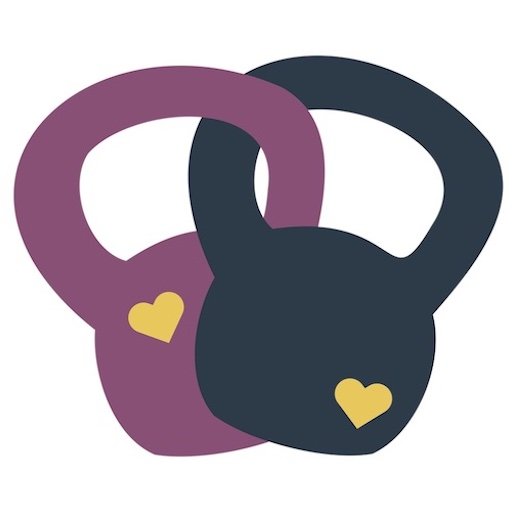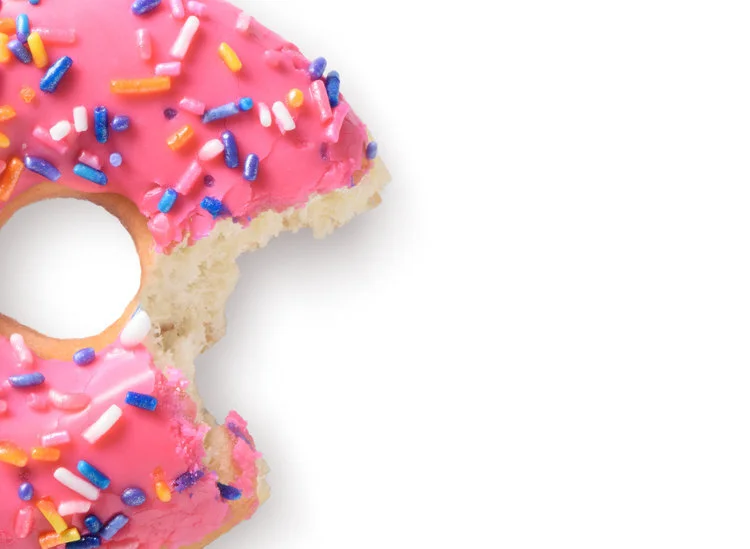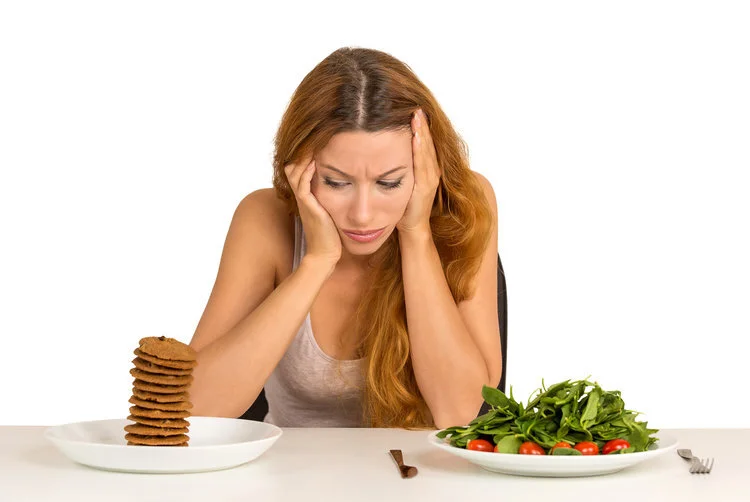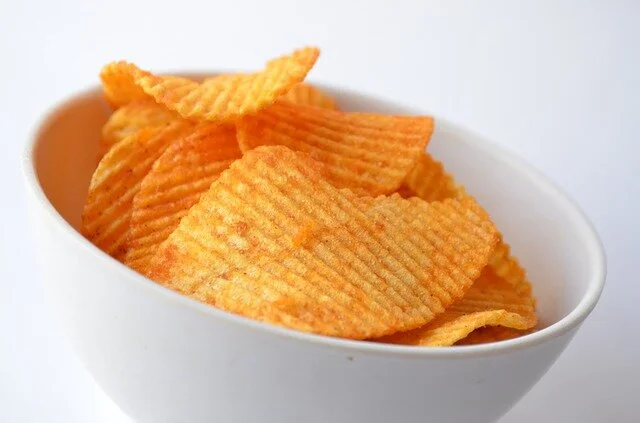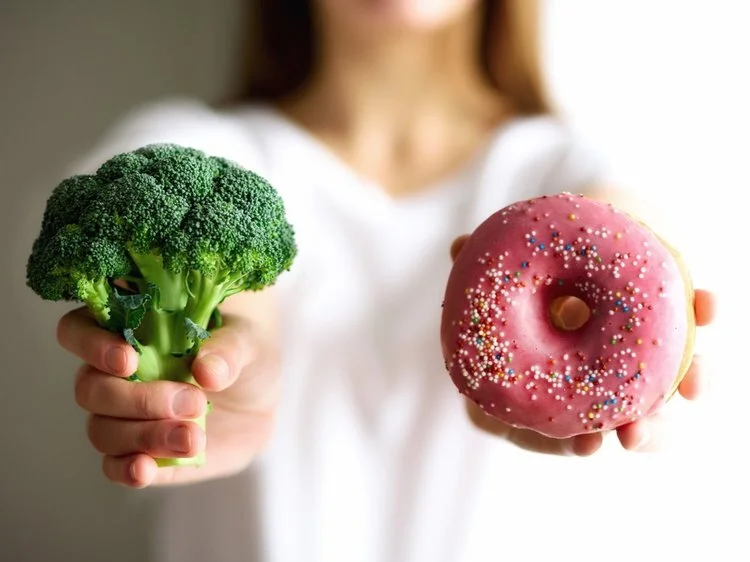HOW NOT DIETING IMPROVES YOUR METABOLISM
Have you gone on a diet because you feel sluggish, only to feel more sluggish? Do you gain weight when eating “normal” amounts of food? Have you found a way of eating that eliminates all your problem foods (and all of your joy), but if you take just a few days off you regain weight?
Unfortunately, diets often make your metabolism worse. If you’ve never experienced this, you are lucky. Diets manipulate the body in so many ways, and this often results in impaired metabolism.
What do I mean by that? Well, metabolism is the act of producing energy from food, as well as cellular processes that are required for body maintenance. These include hormone production, tear-down and build-up of bones and muscles, reconstruction of organ tissues, and immune system function. So…basically everything in your body is affected by dieting.
HERE’S A COUPLE OF KEY REASONS “UNDIETING” OR THE ACT OF QUITTING YOUR DIET CAN ACTUALLY HELP YOUR METABOLISM.
Donuts can be part of your life AND you can eat healthfully. It doesn’t have to be either-or!
Less stress about food = happy hormones
One of the biggest benefits of not dieting is that you can eat without thinking or stressing too much about it. Now, if you’re a foodie, I’m not talking about the little buzz you get off of trying an exclusive goat cheese mixed with local herbs.
I’m talking about the nonstop chatter that goes on in your mind when you’re dieting: “I’m hungry. I can’t wait until it’s time to eat. Oh good, I can have this bite of cucumber because it’s “clean.” No way am I having cake at the party this weekend. I really want a cookie, but I’ll have this date with almond butter instead. Um, that was definitely not like a cookie. I’m hungry.”
Have you been in this situation? Stuck between a “good” food choice and a “bad” food choice? What if you ate some salad (and some protein) AND had one or two cookies? A whole stack of cookies alone probably won’t satisfy you, and it might make you feel sick.
Dieting pulls you into the land of constant critical supervision of what goes in your mouth. You can’t enjoy anything because you’re too focused on whether it’s ok to eat, or what you should have eaten, or what you really want to be eating. That’s no way to live!
So how does this relate to metabolism?
Stress = Altered hormone production.
Unhappy hormones = Dysfunctional metabolism
Stress spikes cortisol, insulin, and ghrelin, and these three hormones change your metabolic function:
Cortisol initially mobilizes fat stores for energy, but chronically high levels make it difficult for your body to process sugar efficiently, leading to more fat storage than in normal metabolism. High cortisol can trigger dysfunctions in reproductive hormones, which is why it is really common for me to see a history of dieting in women who have hormone imbalances.
Insulin helps your body process incoming sugar, but overly high levels cause a big drop in blood sugar that can trigger fatigue, irritability, binges, and dysfunctional energy utilization. If insulin is chronically high due to stress or frequent eating, the body can develop insulin resistance. Insulin resistance means that your cells don’t process sugar as well, and are more prone to fat storage. It can lead to diabetes and is a symptom of PCOS.
Ghrelin is the hormone that tells you that you’re hungry…so if it’s higher than normal, you’re going to be hungry all the time. If you honor that hunger, that means you might eat more than your body actually needs. If you ignore your hunger, your body feels stressed and you’re back to square one. Anytime you eat less than your body needs for an extended period of time, extra ghrelin is produced so that you’ll feel hungry and eat. Your body is trying to keep you from starving!
Just by quitting dieting, you can start to reverse the above processes. Obviously, this doesn’t work if you remain stressed about your eating. But, if you start to think of food as nourishment (and not an objective to be achieved), you can begin to normalize cortisol, insulin, and ghrelin production.
Eating can be a social event, not just an opportunity for physical nourishment. What foods do you enjoy most with friends? Do you relax food rules around other people? Why or why not?
No off-limits foods = Less out-of-control eating
This may seem counterproductive to you. If we can’t control ourselves around certain foods, aren’t we supposed to keep them out of the house? Isn’t that a recipe for disaster?
ONLY IF YOU CONVINCE YOURSELF OF THAT.
Oreos, chips, gummy bears, and bread are just foods, like broccoli, steak, apples, and rice.. They can’t control you. If you tell yourself that certain foods have a hold on you, your perception of their power will only increase. You might be like some of my clients, who have a black and white way of thinking about food. The food you love most, which may contribute to some of your health problems, is “bad.” If you have any of it, you feel that you’ve blown your whole day and you might as well enjoy more.
Here’s a list of phrases I often hear people use about the foods that are triggering to them:
“I’m not eating cinnamon rolls ever again! I can’t stop with just one.”
I can’t keep that flavor of chip in the house…I’ll eat the whole bag.”
“I try to not eat chocolate candy, but I keep coming across it and ending up with a sugar headache after I’ve overindulged.”
What do you feel when you see this image? Does it make you want to eat chips? Would this serving size satisfy you? Once you started eating, would you feel comfortable stopping at one serving?
There is often a false dichotomy created about food: it’s either healthy or it’s not. The truth is, there is a wide spectrum of foods that can be more or less healthy, and often it depends on the individual person’s genetics and current health situation. When you say a certain food is off-limits because it is unhealthy or because you feel that you can’t control yourself around it, the brain often response with a greater desire for that food than you had before.
Or, maybe you resist the call of your favorite food, only to feel unsatisfied with the “good” food that you eat instead. This can lead to binging later, when your brain finally decides that the effort of resisting the food is not worth the benefit. And you end up halfway through a tub of ice cream, wondering what happened.
MANY PEOPLE FEEL SHAME WHEN TALKING ABOUT EXPERIENCES LIKE THIS.
Usually, the shame comes from feeling like they failed because they weren’t strong enough. But the human brain is complex, and there are often significant underlying physical functions that contribute to a person’s inability to eat a very tasty food in moderation. That’s why it’s important to view foods as neither “good” nor “bad.” It’s just food.
Rather than depend on your will power (which will eventually give out), what if you reframed your attitude toward these foods? It can be extremely challenging, and also so empowering.
What if broccoli and donuts both had a place on your plate? Would you enjoy them more? Would your overall food intake be more nutritious? Could you find balance?
Yes, there are foods that are more beneficial to your physical health, and yes, there are foods that can cause blood sugar fluctuations that result in low energy, cravings, or headaches. If you allow yourself to eat the foods that taste good to you AND also choose foods that you know help you feel your best, you will be both happy and healthy.
IT DOESN’T HAVE TO BE ONE OR THE OTHER!
When you avoid food restriction and instead focus on eating foods that make you feel good and foods that bring you joy, your metabolism will naturally improve.
HOW IS THIS POSSIBLE?
Well, food restriction and chronic dieting is linked to binging and feeling out-of-control around food. Typically, if you restrict food and/or adhere to a specific eating style (AKA diet), you’ll find that the stress of following the rules (or the extreme caloric deficit resulting from the restriction/diet) is contraindicated to your health. Your brain decides that it’s not good for you, and increases your ghrelin so much that you have to eat more. Or, your reproductive hormones go crazy and symptoms start to come out of nowhere.
AND WHEN YOU CRASH, YOU CRASH HARD.
The crash may come in the form of binging, but it can also present as hypothyroid, anxiety, depression, PMDD, acne, hypoglycemia, etc. If you’re not eating enough, your hormones can only take so much before they go haywire. And dysfunctional hormones usually lead to a slower metabolism.
Ironically, by eliminating dieting, you gradually increase your sense of normalcy around food. This leads to fewer binges and overeating, which will help your metabolism return to normal. When you eat enough, you’re more likely to get the micronutrients you need for hormone balance (which also supports metabolism).
If you’ve struggled for a long time with food restriction and/or overeating, you may need to work with a health practitioner to help you find this sense of normalcy. And if you have symptoms of hormone imbalance due to food restriction, it will take time to heal. This is something that I help all of my nutrition clients with, and you can also find support by joining the intuitive eating community on social media.
FOR MORE INFORMATION ABOUT INTUITIVE EATING, READ MY BLOG HERE.
If you stop dieting, your body can return to normal. However, this takes time and patience. If you’ve been restricting for a long time, you might regain a few pounds. You might feel bloated. You could decide that this whole intuitive eating thing isn’t for you…and that’s ok! It’s totally your choice. Just remember that dieting got you into this mess, and it’s not going to get you out of it. When you’re ready to stop the rollercoaster ride of restriction, not-dieting will be there for you.
References:
Tomiyama et al., 2010. Low calorie dieting increases cortisol. Psychosomatic Medicine, 72 (4), 357-364.
Montani, J. P., Schutz, Y., & Dullow, A. G. (2015). Dieting and weight cycling as risk factors for cardiometabolic diseases: who is really at risk? Obesity Review, 1, 7-18.
Craven, M. P. & Fekeete, E. M. (2019). Weight-related shame and guilt, intuitive eating, and binge eating in female college students. Eating Behaviors, 33, 44-48.
